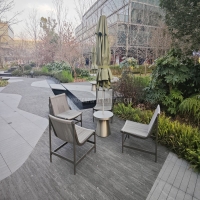Welcome to the website for landscape facilities products and knowledge.
How do landscape chairs perform in terms of resistance to chemical exposure from cleaners or pool chemicals?
Landscape chairs are a popular choice for outdoor spaces, especially near pools and patios, where exposure to chemicals like chlorine and cleaning agents is common. Their performance in resisting chemical damage largely depends on the materials used in their construction.
High-quality landscape chairs are often made from materials such as powder-coated aluminum, synthetic wicker, or UV-resistant plastics, which offer excellent resistance to chemical corrosion. Powder-coated aluminum, for instance, provides a protective layer that prevents cleaners or pool chemicals from penetrating and causing rust or degradation. Synthetic wicker, typically crafted from resin or polyethylene, is also highly resistant to chemical exposure, making it a durable option for poolside settings.
Regular maintenance, such as rinsing chairs with fresh water after exposure to pool chemicals, can further enhance their longevity. Avoid using harsh abrasives or acidic cleaners, as these may compromise the protective coatings or materials over time.
For optimal performance, choose landscape chairs specifically labeled as chemical-resistant or designed for outdoor use. This ensures they can withstand frequent exposure to cleaning agents and pool treatments without significant wear. Investing in high-quality, chemically resistant landscape chairs guarantees both aesthetic appeal and long-term durability for your outdoor space.
Related search:

Recommendation
Metal structure rattan chair without armrests for single person, with woven seat and backrest.